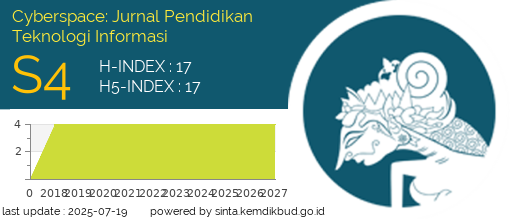THE DEVELOPMENT OF E-MODULES PROBLEM BASED LEARNING USING GOOLE CLASSROOM FOR BASIC ELECTRICITY AND ELECTRONICS AT VOCATIONAL SCHOOL
DOI:
https://doi.org/10.22373/cj.v4i2.7861Kata Kunci:
e-modules problem based learning, Google Classroom, media development, vocational education, students learning outcomes.Abstrak
The purpose of this research is to produce a valid e-modules problem based learning using Google Classroom practical, and effective in basic electricity and electronics subjects. This e-modules problem based learning using Google Classroom is designed to improve student’s understanding so that it can improve students learning outcomes. The method in this study uses Research and Development (R&D) with 4-D development procedures (Define, Design, Develop, Desseminate). The data of analysis technique uses descriptive analysis techniques to describe the validity, practicality, and effectiveness of e-modules problem based learning using Google Classroom. The results obtained of this development research: The validity of e-modules problem based learning using Google Classroom is declared valid on the media and material aspects. The practicality of e-modules problem based learning using Google Classroom from teacher and student responses is stated to be very practical. The effectiveness of e-modules problem based learning using Google Classroom is stated to be effective in improve to learn the outcomes. Based on the findings of this study it is concluded that the e-modules problem based learning using Google Classroom is valid, practical, and effective to be used as a learning aid in basic electricity and electronics subjects.
Referensi
I. Yustanti and D. Novita, “Pemanfaatan E-Learning Bagi Para Pendidik Di Era Digital 4 . 0,” Pros. Semin. Nas., pp. 338–346, 2019, [Online]. Available: https://jurnal.univpgri-palembang.ac.id/index.php/Prosidingpps/article/download/2543/2357.
S. Sohibun and F. Y. Ade, “Pengembangan Media Pembelajaran Berbasis Virtual Class Berbantuan Google Drive,” Tadris J. Kegur. dan Ilmu Tarb., vol. 2, no. 2, p. 121, 2017, doi: 10.24042/tadris.v2i2.2177.
A. Gumrowi, “Meningkatkan Hasil Belajar Listrik Dinamik menggunakan Strategi Pembelajaran Team Assisted Individualization melalui Simulasi Crocodile Physics,” J. Ilm. Pendidik. Fis. Al-Biruni, vol. 5, no. 1, p. 105, 2016, doi: 10.24042/jpifalbiruni.v5i1.110.
E. Nurfalah, “Optimalisasi E-Learning berbasis Virtual Class dengan Google Classroom sebagai Media Pembelajaran Fisika,” Phys. Educ. Res. J., vol. 1, no. 1, p. 46, 2019, doi: 10.21580/perj.2019.1.1.3977.
E. D. S. Eliana, Senam, I. Wilujeng, and Jumadi, “The effectiveness of project-based e-learning to improve ICT literacy,” J. Pendidik. IPA Indones., vol. 5, no. 1, pp. 51–55, 2016, doi: 10.15294/jpii.v5i1.5789.
E. Zaduqisti, Pembelajaran Berbasis Masalah dalam Prediksi Dimensi Nilai Budaya. Pekalongan: CV. Duta Media Utama, 2015.
A. Hakim, Barir, “Efektivitas E-Learning Moodie, Google Classroom dan Edmodo,” J. I-Statemet, vol. 02, no. 1, p. 2, 2016.
I. Laili, G. Ganefri, and U. Usmeldi, “Efektivitas pengembangan e-modul project based learning pada mata pelajaran instalasi,” J. Imiah Pendidik. dan Pembelajaran, vol. 3, no. 3, pp. 306–315, 2019, doi: 10.23887/jipp.v3i3.21840.
Ngalimun, Strategi dan Model Pembelajaran. Yogyakarta: Aswaja Pressindo, 2013.
Rusman, Model-model Pembelajaran, Mengembangkan Profesionalisme Guru. Jakarta: Rajawali Press, 2010.
Richard I Arends, Learning to Teach, Belajar untuk Mengajar. Yogyakarta: Pustaka Belajar, 2007.
D. B. P. Pradana and R. Harimurti, “Pengaruh Penerapan Tools Google Classroom Pada Model Pembelajaran Project Based Learning Terhadap Hasil Belajar Siswa Diemas Bagas Panca Pradana Pendidikan Teknologi Informasi , Fakultas Teknik , Universitas Negeri Surabaya , Email : diemaspradana@mhs.une,” IT-Edu, vol. 02, no. 01, p. 62, 2017.
M. I. S. Sivasailam Thiagarajan, Dorothy S. Semmel, Instructional Development for Training Teachers of Exceptional Children: A Sourcebook. Center for Innovation in Teaching the Handicapped. Indiana: Indiana University Bloomington, 1974.
Unduhan
File Tambahan
Diterbitkan
Terbitan
Bagian
Lisensi
Authors who publish with Cyberspace Journal agree to the following terms:
- Authors retain copyright and grant the journal right of first publication with the work simultaneously licensed under a Creative Commons Attribution License that allows others to share the work with an acknowledgement of the work's authorship and initial publication in this journal.
- Authors are able to enter into separate, additional contractual arrangements for the non-exclusive distribution of the journal's published version of the work (e.g., post it to an institutional repository or publish it in a book), with an acknowledgement of its initial publication in this journal.
- Authors are permitted and encouraged to post their work online (e.g., in institutional repositories or on their website) prior to and during the submission process, as it can lead to productive exchanges, as well as earlier and greater citation of published work (See The Effect of Open Access).



















